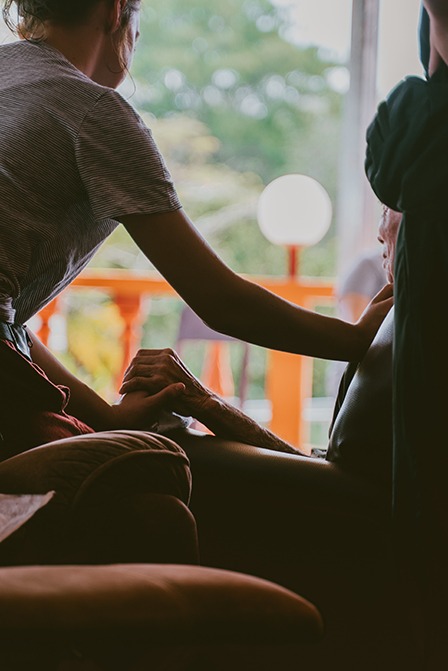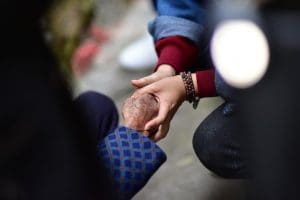This article originally appeared on the Diverse Elders Coalition blog.
Earlier this year, the National Indian Council on Aging (NICOA) had the opportunity to host several focus groups with American Indian family caregivers in Albuquerque, New Mexico. NICOA organized four focus groups with a total of 31 participants. The purpose of the groups was to learn more about their experiences helping an older family member or friend with health problems and disabilities. During the focus groups, we learned about their caregiving duties, the challenges they face and their encounters with healthcare professionals.
 Our focus groups revealed how caregivers’ lives are impacted by their role. Many American Indian caregivers spoke about skipping appointments and neglecting their own health as well as deferring goals, like continuing education, saying they sometimes felt like they didn’t have a life or that their life was on hold. Several reported that caregiving was hard on romantic relationships, saying “men don’t want to date a woman who is taking care of her mom”.
Our focus groups revealed how caregivers’ lives are impacted by their role. Many American Indian caregivers spoke about skipping appointments and neglecting their own health as well as deferring goals, like continuing education, saying they sometimes felt like they didn’t have a life or that their life was on hold. Several reported that caregiving was hard on romantic relationships, saying “men don’t want to date a woman who is taking care of her mom”.
Caregiving chores take up a lot of time and money and require a lot of planning and organizing. Caregivers say they find themselves feeling hypervigilant and stressed out. They reported sleeping poorly, experiencing mental health issues and occasionally taking their anger out on their children.
Caregivers also experience a lot of financial difficulties because of the care they provide. They are unable to return to work full-time or at all and cannot save money to buy their own home. They sometimes need to pay their loved one’s bills and often provide gas money, groceries and/or meals. Caregivers say they constantly save receipts and often worry about relatives accusing them of financial abuse. “If stuff goes missing, people look for someone to blame,” one caregiver said. Caregivers sometimes pay their loved one’s bills just to avoid any accusations that they’re stealing money.
Caregivers said they wish they could better assist their loved ones with unexpected bills, managing medications and tax issues. They also reported needing Alzheimer’s dementia training, assistance navigating the Veterans Administration, understanding the responsibilities that come with power of attorney designation, and planning how assets are distributed after death. “Lots of people don’t have a will or plan in place so children can know how to honor their wishes,” said one caregiver.
Focus group participants also spoke about the barriers they’ve encountered when seeking and receiving help from healthcare providers. These obstacles included bureaucracy, transportation issues, limited office hours and poor insurance coverage. American Indian caregivers wish healthcare providers would be more open-minded and listen more — to both the patient and their caregiver. They feel that healthcare providers don’t fully understand that caregiving is a full-time job, which makes caregivers very knowledgeable about their loved one and their needs as well as hyperaware of any changes in their health. Healthcare professionals need to understand both the patient’s level of health literacy and the caregivers.
 Healthcare professionals also need a better understanding of cultural norms. “Many elders hate hospitals, they remember days of forced sterilization and have historical trauma from those experiences,” said one caregiver. Others may prefer a healthcare professional of the same gender or be uncomfortable with the topic of death and dying, viewing it as taboo. Sometimes American Indian elders have trouble speaking up, preferring the caregiver to fill in the gaps and advocate on their behalf.
Healthcare professionals also need a better understanding of cultural norms. “Many elders hate hospitals, they remember days of forced sterilization and have historical trauma from those experiences,” said one caregiver. Others may prefer a healthcare professional of the same gender or be uncomfortable with the topic of death and dying, viewing it as taboo. Sometimes American Indian elders have trouble speaking up, preferring the caregiver to fill in the gaps and advocate on their behalf.
Despite the hardships, American Indian caregivers say they find it difficult to relinquish control and leave their loved one to take a break. Many reported feeling guilty and anxious about someone else caring for their loved one. In general, our participants did not see caregiving as a difficulty and felt that other relatives were missing out by not being more involved in their loved one’s life.
NICOA’s caregiving research is generously supported by The John A. Hartford Foundation. This focus group is one of a nationwide series of focus groups with family caregivers in communities of color, LGBT communities and American Indian and Alaska Native communities.
I support everything that was mentioned in this article. It’s very fustrating, time consuming, no life, suspicious relatives who don’t help. l commend all caregivers, I was one.